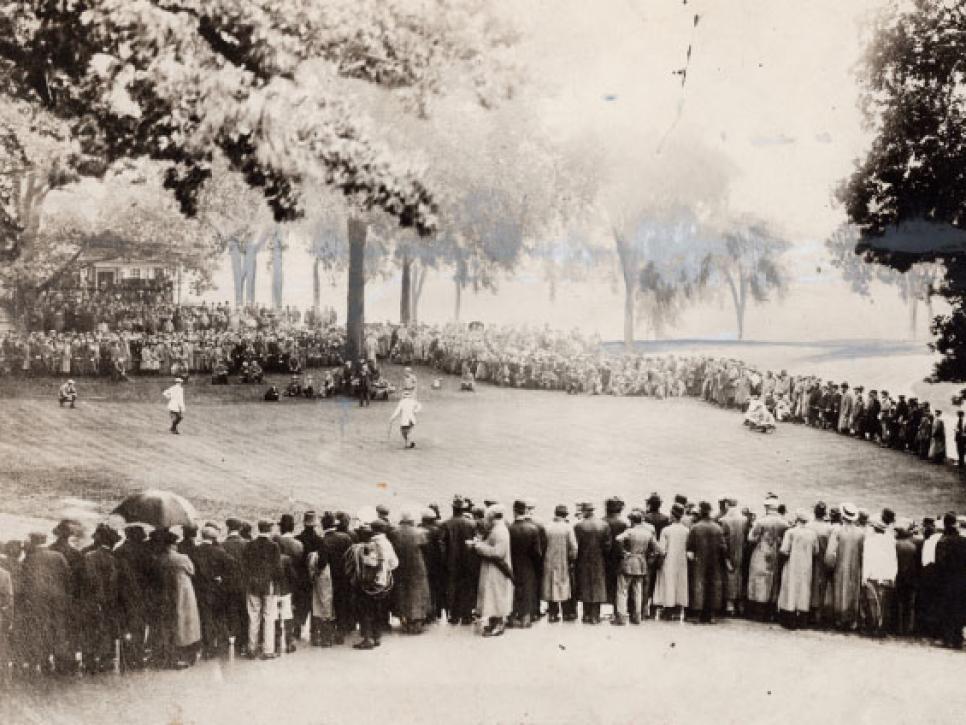News
100 Years Later, Ouimet Resonates

1913 PLAYOFF: Francis Ouimet (crouching), Harry Vardon and Ted Ray on the 18th green at Brookline.
Before the final round a writer predicted it would be "the greatest game ever played." When it was all over, he remembered it as "the shots heard around the world."
Bernard Darwin, dean emeritus of golf writers--and grandson of the immortal scientific Darwin--covered the 1913 United States Open for the papers of Lord Northcliffe, a notorious English press baron who sponsored the grand American tour of British champions Harry Vardon and Ted Ray. As expected, his mercenaries laid waste to the finest American competition from coast to coast, Northcliffe's revenge for the victory of an upstart Yank--Walter Travis--in the British Amateur almost a decade earlier. Their campaign of conquest was supposed to climax with victory at the U.S. Open in Brookline, Mass. This was considered such a foregone conclusion that the date of the tournament had been moved three months later just to accommodate their travel schedule.
Enter Francis Ouimet. A 20-year-old amateur, son of working-class immigrants, who grew up across the street from The Country Club at Brookline. An untested kid who'd caddied there for years, while patiently crafting his game under the tutelage of the resident caddiemaster. Tall, lanky, sweet-natured, Ouimet had also idolized Vardon since he was old enough to grip a sawed-off niblick. Francis got into the Open field over the objections of the club's grandees, who thought having a former caddie represent them a major mortification. Then his seasoned caddie quit before the tournament, when a pro craving local knowledge waved a handful of cash in his face. Panicked and desperate, on the spot Francis hired his caddie's younger brother, Eddie Lowery, a 10-year-old dead-end kid who'd played hooky and slipped onto the grounds to watch the final practice round.
If you've ever read my account of the Open, The Greatest Game Ever Played, or seen the movie we made in 2005, you know what happened next. If I hadn't written it all from fact--after six months' scrutinizing every newspaper account--I'd swear myself it was fiction. This is the mother and father of all underdog stories, one David against two Goliaths. Eddie Lowery turns out to be both Sancho Panza and pint-size Freud, the perfect sidekick who keeps his charge supernaturally calm and focused. This is a story of courage, friendship, kindness, brotherhood, chivalry, and in the end the only villain is the class system. When Ouimet ties Vardon and Ray in the final round and then beats them in an 18-hole playoff, becoming the first American-born amateur to win his country's premier title--in fact, the first amateur to do so--it's as much a victory over the class system as it is a sports story.
I believe that's why Francis' accomplishment resonated the way it did, and still does. His win put golf--a fledgling sport in the United States, owned and fiercely protected by the upper classes--on the front page of every paper in the land. In a country of immigrants struggling to find a foothold, Ouimet's story spoke to them in bold headline print. Almost overnight the sport of golf morphed into a game that everyone wanted to, and would soon be able to play. The first two generations of great American-born champions--Jones, Sarazen, Nelson and Hogan--all would cite Ouimet as the match that lit the fuse of their hopes and dreams.
Ouimet's win is the Big Bang of American golf. Unknowable, in the end, but it's more than possible that without him the game might never have developed on these shores the way it did. What's beyond dispute is that this happened as much because of Ouimet's character as his achievements on the course. He would go on to win two U.S. Amateur titles and remain a beloved international ambassador for the game throughout his life. In 1949 he founded a college scholarship fund for underprivileged kids like Eddie and himself who'd given service to their game. (Eddie, who to the surprise of almost no one, went on to become a multimillionaire businessman, became a major contributor.) Today the Francis Ouimet Scholarship Fund awards $1.5 million a year.
In the fun house of today's metastisizing sports-entertainment megaplex, when every day brings another story revealing how these "heroes" we create are fashioned from base clay, a pause might be in order to reflect on athletes who actually embodied the qualities we think we admire in the too-easily deified. Jackie Robinson's on the list. Byron Nelson and John Wooden are on mine. You undoubtedly have names to add.
But the list begins with Francis Ouimet.
Mark Frost's latest novel, The Paladin Prophecy, is in bookstores now.

.jpg)